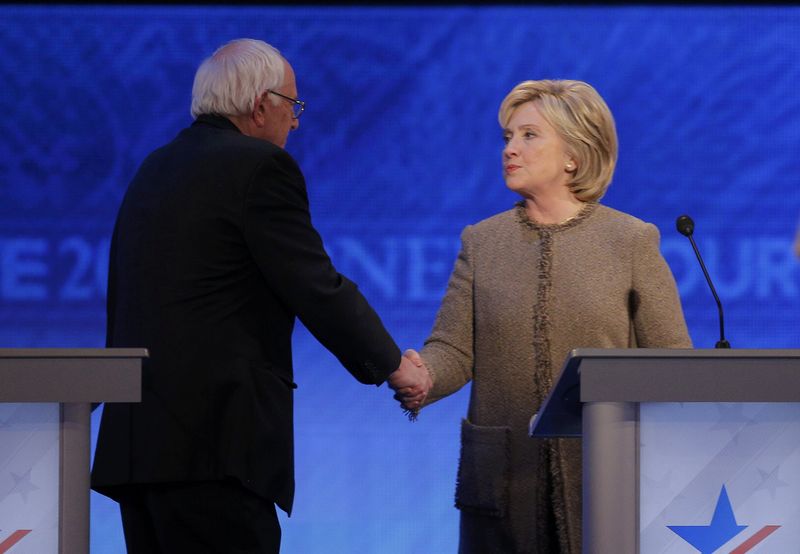By John Whitesides and Luciana Lopez
MANCHESTER, N.H. (Reuters) - U.S. Democratic presidential front-runner Hillary Clinton backed elements of President Barack Obama's strategy to fight Islamic State militants in a debate on Saturday, drawing criticism from all sides for saying "we now finally are where we need to be" in Syria.
Top rival Bernie Sanders accused Clinton of being too quick to push for regime change, while Republican candidate Carly Fiorina, said the former secretary of state was too willing to cede U.S. policy to other countries.
The debate was the Democrats' first since the deadly Dec. 2 attack by a pair of radicalized Muslims in San Bernardino, California, which along with the November attacks in Paris elevated national security to the top of the campaign agenda.
Obama has relied heavily on U.S. air strikes against Islamic State targets in Syria and Iraq, and has deployed dozens of special operations troops to northern Syria to advise opposition forces. In Iraq, about 3,500 U.S. troops are assisting Iraqi forces.
Like Obama, Clinton backs the use of special forces but says a large deployment of U.S. ground forces in the Middle East would be counterproductive.
"We now finally are where we need to be. We have a strategy and a commitment to go after ISIS," she said, noting a U.N. Security Council resolution had brought "the world together to go after a political transition in Syria."
That drew a quick response from Republican candidates, who seized the opportunity to tie Clinton to a Syria strategy that has yielded few tangible gains to date.
Fiorina, a former technology executive, said Clinton is too willing to rely on U.N resolutions rather than acting unilaterally. "It's what 'leading from behind' is, I guess," she said on "Fox News Sunday."
"No, Hillary Clinton, we are not 'where we need to be' in fight against ISIS," former Florida Governor Jeb Bush wrote on Twitter (N:TWTR) during the debate. Hours later, his campaign released a video contrasting her comments with TV footage of the San Bernardino and Paris attacks.
Attacking from the other side, Sanders said the United States should focus on defeating Islamic State, also known as ISIS or ISIL, rather than also trying to remove Syrian President Bashar al-Assad from power.
"We could get rid of Assad tomorrow, but that would create another political vacuum that would benefit ISIS," the Vermont senator said.
Since the start of the conflict in 2011, the Obama administration has applied diplomatic pressure to push Assad out of office but has stopped short of military attacks against his regime.
Clinton backs that approach, but has struck a more hawkish tone in other areas. She has called for more airstrikes and a greater use of special-operations ground forces and supports setting up a no-fly zone. Obama says enforcing a no-fly zone would require aircraft and other assets that could be better deployed directly against Islamic State.
DYNAMIC OF RACE UNCHANGED
Clinton also vowed not to raise taxes on middle-class Americans if elected next November, questioning the affordability of some of Sanders' proposals such as creation of a single-payer healthcare system and tuition-free college.
With just six weeks left until Iowa kicks off the Democratic nominating contest on Feb. 1, the debate appeared to do little to change the trajectory of the 2016 Democratic presidential race for the White House.
Clinton holds a big lead in national polls over Sanders and former Maryland Governor Martin O'Malley, who are both still searching for breakthrough moments that could shift the dynamic.
In a two-hour debate that largely focused on foreign policy, Clinton also defended her advocacy in 2011 for ousting Libyan strongman Muammar Gaddafi, a position which Republican presidential candidates have criticized.
"I am not giving up on Libya and no one should," Clinton said.
She also accused Sanders of hypocrisy for supporting regime change in Libya when he had voted in the Senate for a non-binding resolution that called on Gaddafi to resign and support a peaceful transition to democracy.
Clinton also defended her support for a no-fly zone in Syria, which she said would create safe areas to protect people on the ground from Assad's forces and Islamic State.
But when pressed by the debate moderators, she would not say if that meant she would be willing to shoot down Russian planes, saying "I do not think it would come to that. We are already de-conflicting air space."
Clinton zeroed in on Republican presidential front-runner Donald Trump, saying his vow to ban Muslims from entering the United States is helping Islamic State militants recruit new members.
That drew a sharp response from Trump. "It's nonsense - it's just another Hillary lie," he said on NBC's "Meet the Press."
Clinton's endorsement of Obama's Syria strategy could haunt her if the conflict takes a turn for the worse, said Democratic strategist Bud Jackson.

"Everything is so unpredictable in Syria," he said. "Even the smallest things can be capitalized on as an 'I told you so.'"